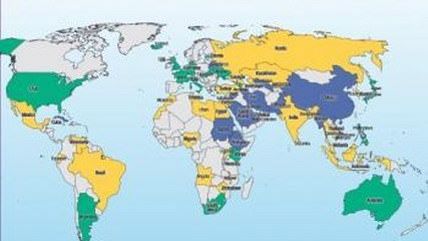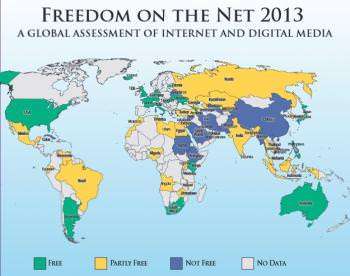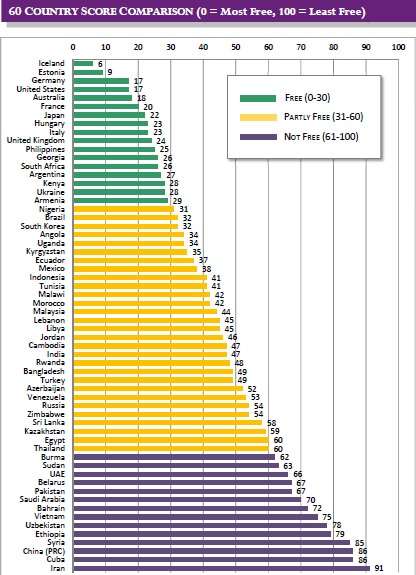Internet Freedom Loses Ground Around the World, Says Report, But Not Without a Fight


It's no surprise, in the year of Edward Snowden and after the bust of the wonderfully free-market Silk Road and its alleged proprietor, that the Internet isn't quite as free as it used to be. But according to a new report from Freedom House, it's not just NSA targets and online purveyors of disfavored intoxicants that have taken a hit: surveillance, censorship and arrests of social media-wielding dissidents have cast a pall over what was once a more-anarchic medium. In response, however, authoritarian officials sparked push-back by activists who blocked some repressive laws and even pressured regimes to repeal previously imposed measures.
In Freedom House's Freedom on the Net 2013: A Global Assessment of Internet and Digital Media, the authors write:
[G]lobal internet freedom has been in decline for the three consecutive years tracked by this project, and the threats are becoming more widespread.
Of particular concern are the proliferation of laws, regulations, and directives to restrict online speech; a dramatic increase in arrests of individuals for something they posted online; legal cases and intimidation against social-media users; and a rise in surveillance. In authoritarian states, these tools are often used to censor and punish users who engage in online speech that is deemed critical of the government, royalty, or the dominant religion. In some countries, even blogging about environmental pollution, posting a video of a cynical rap song, or tweeting about the town mayor' s poor parking could draw the police to a user's door. Although democratic states generally do not target political speech, several have sought to implement disproportionate restrictions on content they perceive as harmful or illegal, such as pornography, hate speech, and pirated media.
Specifically, of the 60 countries examined by the report, 34 have experienced declines in Internet freedom. Those countries include not just the usual suspects trying to smother criticism of fearless leader, but also "democracies, often as a result of struggles to balance freedom of expression with security." India gets called out, in particular, for blocking Internet and mobile communications, restricting online content and bringing charges against social med users for their posts.
Brazil also gets a dishonorable mention for election-related content restrictions, and for violence against online journalists.

And then, of course, there's Uncle Snoopy himself: the United States and its panty-sniffing intelligence apparatus, particularly the NSA.
The good news, is that authoritarian online policies have caused a reaction by advocates of freedom and privacy:
[I]n a number of places around the world, growing efforts by civic activists, technology companies, and everyday internet users have been able to stall, at least in part, newly proposed restrictions, forcing governments to either shelve their plans or modify some of the more problematic aspects of draft legislation. In a handful of countries, governments have been increasingly open to engagement with civil society, resulting in the passage of laws perceived to protect internet freedom.
That's not enough to entirely offset the erosion of online freedom, but it means that government efforts to regulate and stifle the Internet don't go unopposed.
Left unmentioned in the report is the growing demand for data havens—that is, for online companies to base themselves in jurisdictions that respect information privacy, and for people to seek out companies that do exactly that. Encryption technology that impedes or totally blocks snoops is gaining popularity for individual, business and government use, with encrypted services basing themselves beyond the borders of countries that demand backdoor access to communications and data.
Internet freedom may be sliding, but it's doing so in such a public way that it has sparked both legal and technological opposition. That's no guarantee of success for privacy and free speech advocates—but it means they're not going down without a fight.


Show Comments (47)